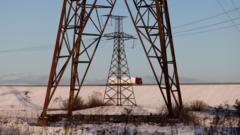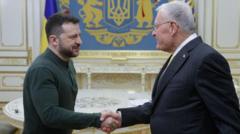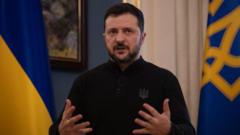The Baltic states, after decades of reliance on Russian electricity, have initiated a significant shift towards integrating with the European energy framework, raising concerns regarding geopolitical tensions.
Baltic States Transition from Russian Electricity Grid to EU Network

Baltic States Transition from Russian Electricity Grid to EU Network
Baltic nations Estonia, Latvia, and Lithuania commence historic disengagement from Russian power grid as they integrate into the EU network.
The Baltic states of Estonia, Latvia, and Lithuania have embarked on a pivotal journey to sever their long-standing energy ties with Russia by transitioning away from the Russian-controlled Brell power grid to join the European Union's electricity network. This historic process commenced on a recent Saturday morning, prompting residents to prepare for potential disruptions much like they would for severe weather events. Instructions included charging devices and stocking up on food and water, alongside warnings to avoid using elevators and expect traffic light outages.
A countdown clock marking the historic moment has been erected in Lithuania's capital, where a ceremony featuring EU chief Ursula von der Leyen takes place. The Brell grid, named for the Baltic states and Belarus, has been a symbol of Moscow's control since the post-World War II era. Despite not purchasing electricity from Russia since 2022, these nations remained entwined within an energy framework that perpetuated Russian influence.
Lithuania’s Energy Minister Zygimantas Vaiciunas emphasized that this move is strategic in removing Moscow's potential for geopolitical manipulation through energy. Academics like Professor David Smith of the Baltic Research Unit highlight that this major shift culminates decades of efforts to lessen energy dependency after accession to the EU and NATO. The severance plans come against the backdrop of rising tensions with Russia, exacerbated by the invasion of Ukraine and a series of incidents involving damaged undersea cables in the Baltic Sea.
Concerns regarding retaliatory measures from Moscow abound, with NATO launching new patrol missions, dubbing it the Baltic Sentry, in response to increasing threats of sabotage. The Latvian President and Prime Minister have acknowledged the potential risks, emphasizing ongoing preparations for various contingency scenarios.
Recent communications from Estonia's Cybersecurity Centre indicate a surge in cyber threats following Russia's invasion of Ukraine, as they brace for possible disinformation campaigns aimed at undermining the energy transition initiative. Previous campaigns have falsely predicted crises related to energy supplies post-transition, indicating a continuation of conflict beyond traditional military engagements.
The Baltic states stand firm in their resolve, determined to navigate the challenges posed by this significant energy realignment while reinforcing their security through unity and international cooperation. The landmark transition marks a significant milestone in their journey towards energy independence and geopolitical stability.
A countdown clock marking the historic moment has been erected in Lithuania's capital, where a ceremony featuring EU chief Ursula von der Leyen takes place. The Brell grid, named for the Baltic states and Belarus, has been a symbol of Moscow's control since the post-World War II era. Despite not purchasing electricity from Russia since 2022, these nations remained entwined within an energy framework that perpetuated Russian influence.
Lithuania’s Energy Minister Zygimantas Vaiciunas emphasized that this move is strategic in removing Moscow's potential for geopolitical manipulation through energy. Academics like Professor David Smith of the Baltic Research Unit highlight that this major shift culminates decades of efforts to lessen energy dependency after accession to the EU and NATO. The severance plans come against the backdrop of rising tensions with Russia, exacerbated by the invasion of Ukraine and a series of incidents involving damaged undersea cables in the Baltic Sea.
Concerns regarding retaliatory measures from Moscow abound, with NATO launching new patrol missions, dubbing it the Baltic Sentry, in response to increasing threats of sabotage. The Latvian President and Prime Minister have acknowledged the potential risks, emphasizing ongoing preparations for various contingency scenarios.
Recent communications from Estonia's Cybersecurity Centre indicate a surge in cyber threats following Russia's invasion of Ukraine, as they brace for possible disinformation campaigns aimed at undermining the energy transition initiative. Previous campaigns have falsely predicted crises related to energy supplies post-transition, indicating a continuation of conflict beyond traditional military engagements.
The Baltic states stand firm in their resolve, determined to navigate the challenges posed by this significant energy realignment while reinforcing their security through unity and international cooperation. The landmark transition marks a significant milestone in their journey towards energy independence and geopolitical stability.























